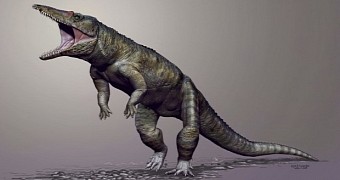A recent paper in the journal Scientific Reports describes a rather scary-looking reptile that roamed the Earth hundreds of millions of years ago and that paleontologists say is one of the forefathers of present-day crocodiles.
The species is officially known as Carnufex carolinensis. However, researchers like to call it the Carolina Butcher, this being the translation of its pompous-sounding moniker.
The reason the reptile was given this name is that its presence in North America eons ago was documented with the help of fossilized remains pulled from ancient sediment deposits in Chatham County, North Carolina.
The sediment deposits that produced the Carnufex carolinensis skull, spine and upper forelimb that led to the discovery of this previously undocumented species are about 231 million years old.
In those times, present-day North Carolina was part and parcel of the ancient massive continent Pangea and a surprisingly wet and warm place, researchers write in the Scientific Reports study describing Carnufex carolinensis.
The Carolina Butcher was a fierce predator
Paleontologists working with the North Carolina State University and the North Carolina Museum of Natural Sciences believe that, before dinosaurs made an appearance in this corner of the world, the Carolina Butcher was among North America's top predators.
As illustrated in the image accompanying this article, the reptile looked much like the crocodiles that inhabit our planet in this day and age. It could walk in its hind legs and preyed on other reptiles it shared its world with, maybe even early mammals.
Based on the fossilized remains thus far recovered from ancient sediment deposits in Chatham County, North Carolina, paleontologists estimate that the average Carnufex carolinensis measured an impressive 9 feet (nearly 3 meters) from head to tail.
This means that, apart from being one of the earliest crocodile ancestors to have until now been discovered, the recently documented Carolina Butcher is also one of the largest reptiles of this kind specialists have so far had the chance to study.
“The discovery of Carnufex, one of the world’s earliest and largest crocodylomorphs, adds new information to the push and pull of top terrestrial predators across Pangea,” North Carolina State University researcher Lindsay Zanno said in a statement.

 14 DAY TRIAL //
14 DAY TRIAL //